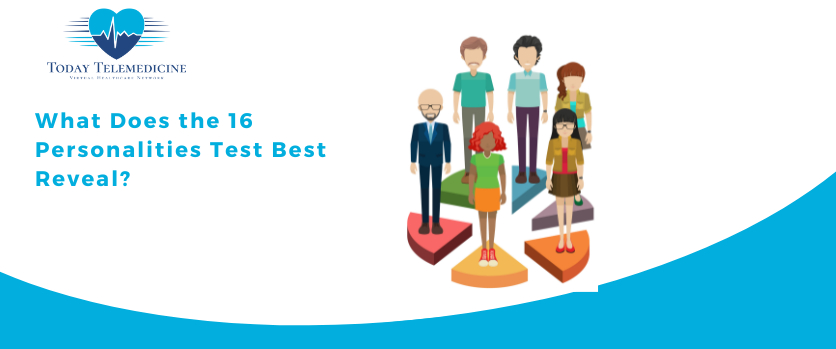Personality tests have gained popularity in recent years. They reveal people’s unique traits and preferences.
The 16 Personalities test stands out. It’s based on the Myers-Briggs Type Indicator (MBTI).
The MBTI, developed in the 1940s by Isabel Briggs Myers and Katharine Cook Briggs, interprets temperament. It draws on Carl Jung’s theories.
So, “What does the 16 personalities test best reveal?” and how might they benefit our lives?
The tests let you comprehend your nature, strong points, weak points, and what motivates you. Think of it like assembling a puzzle to view the entire snapshot of yourself.
Let’s delve into what the 16 personality test unfolds. You can leverage this to enhance yourself and better understand others.
Today Telemedicine is a telemedicine company helping people with mental health issues. We must address mental and emotional well-being, including understanding personality. Contact us for more information.
What Is the 16 Personalities Test?
Before we answer, “What does the 16 personalities test best reveal?” let’s briefly overview the framework for those unfamiliar.
The 16 Personalities test is based on the Myers-Briggs Type Indicator (MBTI). It identifies an individual’s personality type through four main dimensions:
- Introversion (I) vs. Extraversion (E)
- Sensing (S) vs. Intuition (N)
- Thinking (T) vs. Feeling (F)
- Judging (J) vs. Perceiving (P)
Why Take the Test?
This test offers valuable insights into how people view the world and make decisions. It helps you understand:
- Your strengths
- Your weaknesses
- Your communication preferences
- Your ideal work settings
Knowing your personality type lets you improve your interactions and choose environments that suit you best.
The 16 Personalities model breaks down how we act based on four pairs of preferences.
-
Introversion (I) vs. Extrovert (E)
This distinction spotlights our energy sources. Introverts recharge through alone time and thought, while extroverts thrive around others and with activity.
-
Intuition (N) vs. Sensing (S)
Intuition concentrates on how we absorb information. Sensors hone in on details and the present moment while intuitive focus on the grand scheme and potential.
-
Thinking (T) vs. Feeling (F)
This debate concerns how we make choices. Thinkers rely on facts and logic, whereas feelers weigh emotions and their effects on others.
-
Judging (J) vs. Perceiving (P)
This is about reflecting on how we manage our lives. Judgers plan and adhere to schedules, while perceivers usually stay flexible and eager for change.
These dimensions combine to form 16 unique personality types, each represented by a four-letter code.
For instance, an individual who identifies with introversion, Intuition, Feeling, and Judging would be labeled as an INFJ.
What Does the 16 Personalities Test Best Reveal?
The 16 personality tests show different parts of your behavior. It includes how you talk, make choices, and act in relationships. Here’s what the test can share:
-
Strengths and Weaknesses
Every type of personality has its own merits and demerits. This quiz identifies the qualities and abilities that make you unique. It also pinpoints parts where you might have hurdles or require enhancement.
For instance, people often applaud ISFJs for their dependability and precision. Yet, they might find setting limits and dealing with change quite tricky.
-
Communication Style
The test shows how you like to communicate. Are you direct or reserved? It also reveals how you handle conflicts. Do you confront challenges or seek other solutions? This shows whether you’re introverted or extroverted and prefer working alone or in a team.
-
Motivation and Values
Knowing your drives and beliefs is vital to making choices and taking steps. The quiz shows what motivates you and what you consider rewarding.
For instance, an ENFP is often driven to help others and make a difference. In contrast, an ENTJ typically values order and structure.
-
Information Processing
The test shows if you focus on details or the big picture. It also checks if you like facts (sensing) or ideas (intuition). This reveals your problem-solving style.
For example, an ISTJ prefers a step-by-step approach. Meanwhile, an ENTP likes to explore different ideas.
-
Decision Making
This quiz spotlights how you make choices, showcasing the Thinking (T) against Feeling (F) divide. This insight can boost self-knowledge and hone your response to challenging situations.
For example, a person more inclined to think may value reasoning, while someone more toward feeling might concentrate on balance.
-
Work Preferences
The 16 personalities test works to discover your job likes at work. It pinpoints whether you favor tasks that require attention to detail, creative tasks, or ones that call for leadership. Bosses can use this knowledge to connect people to the right jobs and help them plan their careers.
-
Relationship Dynamics
The test provides insights into your personal and professional relationships, revealing potential areas of conflict or compatibility.
Understanding these dynamics can help you navigate communication differences more effectively.
For example, introverts and extroverts may have different communication styles and compatibility levels.
-
Cognitive Functions
Finally, the test examines your dominant cognitive functions and how you perceive and process information.
For instance, an INTP’s main trait is Introverted Thinking (Ti) and Extroverted Intuition (Ne). This shows they favor thought analysis and coming up with ideas.
How Accurate Is the 16 Personalities Test?
People often wonder if the 16 personality tests are accurate. Yes, they’re well-liked, but they can be hit or miss. The best free “MBTI personality test” typically gives a comprehensive yet insightful snapshot of your personality.
Don’t forget, though, that these tests are based on what you report about yourself. This means the results mirror how you see yourself, not hard facts.
Why Are Personality Tests Considered Self-Reported?
When taking things like the 16 Personalities Test, they’re viewed as self-reported. Why? Because they depend on what individuals say about their ideas, feelings, and actions.
But there’s a catch. People might describe themselves to match their perfect self or how they hope others see them, which can add biases.
Comparing the 16 Personalities Test to Other Assessments
The 16 personality tests are insightful, but they are only one option. Here’s how they compare to other popular personality tests.
The Jungian Functions Test is closely related to the 16 Personalities Test. Both center on mindset functions that guide our actions.
-
Jungian Functions Test
The 16 Personalities Test gives a general snapshot, while the Jungian Functions Test delves further, showing how these mental gears impact your personality.
-
Sixteen Questions
The Sixteen Questions test is another tool used to gauge character attributes. While different from the 16 Personalities Test, known for its thoroughness, the Sixteen Questions test could offer a more straightforward perspective of your personality.
-
Most Accurate Free MBTI Test
Many MBTI tests out there are free and say they’re super accurate. Like the 16 Personalities Test, they can give you neat information about yourself. But not all are equally precise. That’s why picking a good, trusted test matters by getting results you can count on.
-
4 Question Personality Test
The 4 Question Personality Test is a quick, simple way to glimpse your personality. Though not as detailed as the 16 Personalities Test, it’s handy for a quick self-check.
Personality Test Advantages
The 16 Personalities Test offers several advantages:
- This test offers an in-depth look at your personality traits, enhancing self-awareness.
- Its user-friendly nature makes it a good fit for a broad audience.
- The knowledge acquired from the quiz has a beneficial reach, impacting areas like job growth and personal bonds.
Disadvantages and Limitations
While the 16 Personalities Test is beneficial, it is not without limitations:
- As mentioned earlier, self-reported data can be influenced by personal biases.
- There’s a possibility that the test could boil down intricate personality qualities to just 16 types. This may not give a complete picture of your distinct personality.
- Some people point out that personality quizzes, such as the 16 Personalities Test, might not consider cultural variances in assessing personality.
To Wrap It Up, What Does the 16 Personalities Test Best Reveal?
Consider the 16 Personalities Test for self-discovery. It explores your traits, communication, work style, and decision-making. While not magical, it reveals deep insights.
Many find it both detailed and helpful for personal and professional growth.
Were you stuck in life or work? This test could help. It aids in understanding yourself, improving relationships, and excelling at work.
Curious about your true self? Try the 16 Personalities Test. You’ll be surprised by what you learn.
FAQs
Is the 16 personalities test accurate?
The 16 Personalities Test, inspired by the Myers Briggs Type Indicator, offers some insights into character. But, it lacks scientific accuracy. Its reliability can shift based on personal understanding and use.
What’s the benefit of applying my 16 Personalities Test results to my job?
Realizing your personality type helps you select a job that matches your skills and interests. It could also improve office talks and group work by showing how your personality types might connect you and your workmates.





